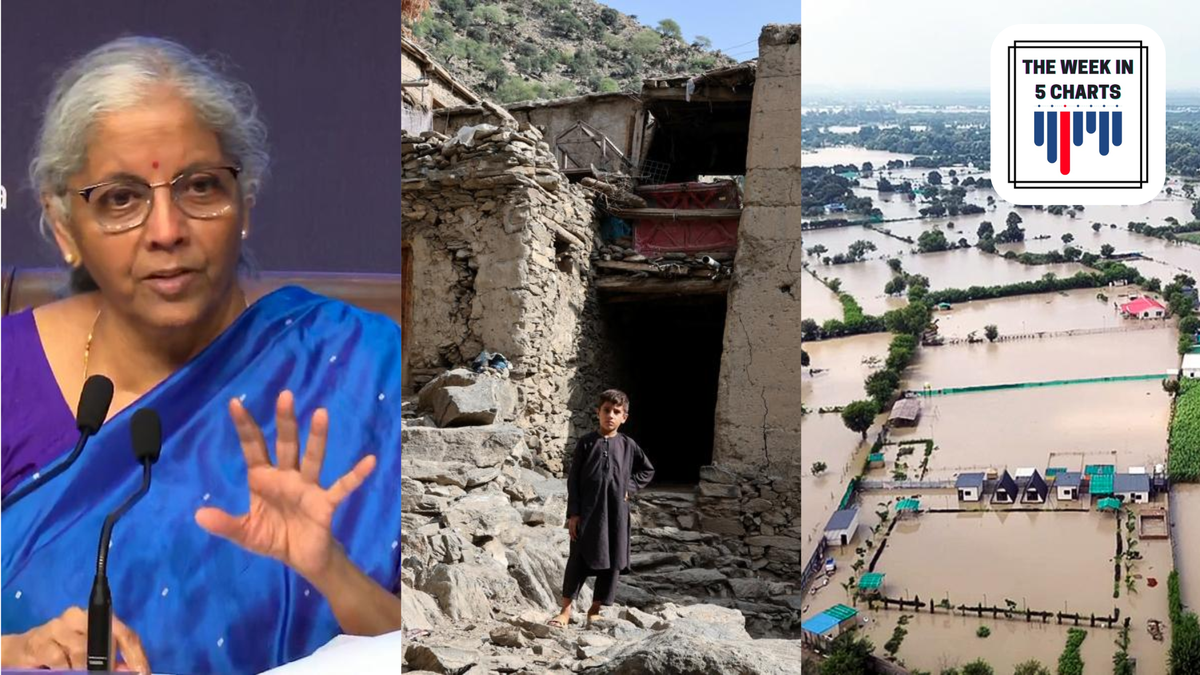(1) Goods and Services Tax rationalisation announced
Union Finance Minister announced the rationalised GST slabs of 5% and 18% after the GST Council’s meeting on Wednesday last week (September 3, 2025). The rationalisation removed the 12% and 28% tax slabs, making several products cheaper. On the other hand, a 40% slab made some sin goods like cigarettes and services like casinos and race clubs, along with IPL events more expensive.
Of the total state-bound GST collected in 2024-25, around 60% went to six States. Maharashtra’s collections stood at ₹3,59,855 crores, followed by Karnataka, Gujarat, Tamil Nadu, Haryana and Uttar Pradesh.
Finance Ministers of Karnataka and Tamil Nadu, along with six other States, had proposed a cess to be imposed over and above the 40% tax rate on sin goods to make up for losses due to reduced rates on other products. They said that State revenues will be impacted between 15% to 20% after the rationalisation. This was similar to the cess mechanism followed by the Centre after 2017 to compensate States for the newly introduced GST’s impact.

(2) Intense rainfall batters States in northern India
Heavy rain and floods have battered States in northern India in the past few days, causing severe damage to life and property.
Amidst Punjab witnessing heavy rainfall, around 37 lives have been lost due to severe flood, announced the State government on Thursday (September 4, 2025). Except the districts of Ferozpur and Faridkot, which also received excess rainfall in the period between August 28 and September 3, all other districts received over 200% of the average (expected) rainfall in the same period, as shown in the map below.
Meanwhile, in the national capital, the water level in the Yamuna river at Old Railway Bridge stood at 207.48 metres on Thursday morning, even as floodwater from the raging river continued to inundate nearby areas. Over the weekend of September 6-7, the water levels receded below the danger mark of 205.33 metres after 9 p.m. on September 7 (Sunday).
Police rescued and evacuated nearly 200 families from flood-affected areas of Srinagar district as flood fears in the rest of the valley eased slightly following the receding of the water level in Jhelum on Thursday (September 4, 2025).
The district police have also formed quick reaction teams to actively provide assistance to stranded citizens, a police spokesperson said.

(3) K. Kavitha suspended from BRS in Telangana
K. Kavitha, the daughter of Bharat Rashtra Samithi founder and former Chief Minister K. Chandrashekar Rao, was suspended from the party after a series of accusations she made against some party leaders of a conspiracy against her father and her.
The allegations were connected to financial and procedural irregularities in the construction of the Kalleshwaram Lift Irrigation Project (KLIP) that were brought out by a judicial commission earlier. Here is a timeline of events that led to the fallout and her eventual suspension.
Adding to Kavitha’s claims, the BRS has been facing the problem of defecting legislators after its defeat in the 2023 Assembly elections to the Congress.

(4) Delhi High Court dismisses bail pleas of 10 accused, including Umar Khalid
The Delhi High Court on Tuesday (September 2, 2025) dismissed the bail pleas of ten accused, including former JNU students Sharjeel Imam and Umar Khalid, in the 2020 Delhi riots larger conspiracy case under the Unlawful Activities (Prevention) Act (UAPA).
A bench comprising Justice Navin Chawla and Justice Shalinder Kaur passed separate orders dismissing the petitions filed by Mr. Imam, Mr. Khalid, Athar Khan, Abdul Khalid Saifi, Gulfisha Fatima, Meeran Haider, Shifa-ur-Rehman, Mohd. Saleem Khan, and Shadab Ahmed. The bail plea of Tasleem Ahmed was heard by a Bench of Justice Subramonium Prasad and Justice Harish Vaidyanathan Shankar was rejected earlier as well.
The accused had argued that their prolonged incarceration and the slow pace of proceedings violated their fundamental right to liberty under Article 21. They pointed out that the prosecution planned to examine nearly 900 witnesses, making an early conclusion of the trial unlikely.
Solicitor General Tushar Mehta, however, opposed the pleas, asserting that the violence was not a routine outbreak but a “well-orchestrated conspiracy” timed with the then U.S. President’s visit. He alleged that Mr. Imam and Mr. Khalid played central roles in instigating violence through inflammatory speeches and organisational planning.
The bench observed that while peaceful protest is a protected right under Article 19(1)(a), it cannot extend to conspiratorial violence. “Any conspiratorial violence under the garb of protests or demonstrations by the citizens cannot be permitted,” the bench said adding that the roles attributed to Imam, Khalid and others were “prima facie grave.”
(5) Afghanistan earthquake
Over 2,200 people were killed in aftershocks after an earthquake struck eastern Afghanistan on August 31. A magnitude-5.5 aftershock on September 2 increased the death toll to over 2,200 in one of the worst earthquakes in the country’s history.
Afghanistan’s location near plate boundaries makes it prone to earthquakes, especially the eastern part of the country. Reports of infrastructure that was not quake-resistant burying people under rubble have put the spotlight on the high infrastructural damage that the country has sustained and building codes not being followed.
A report from the UN Habitat and Afghanistan’s Ministry of Urban Development and Housing says that formal housing remains out of reach for a majority of Afghans. Repeated earthquakes is one of the reasons, along with conflicts in the region, supply bottlenecks associated with factors related to land, building materials, construction processes, serviced land for housing development, and financing.
Published – September 08, 2025 04:34 pm IST


